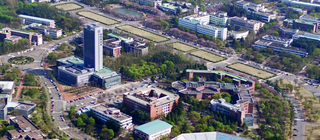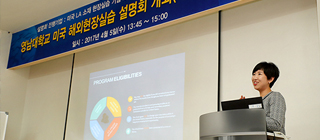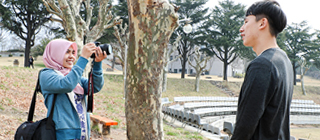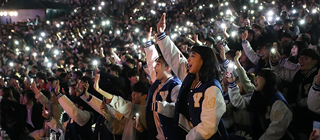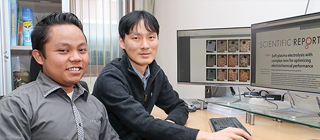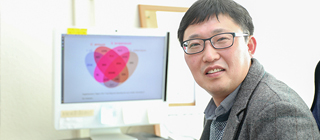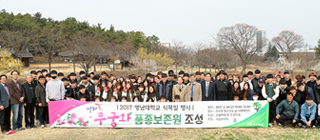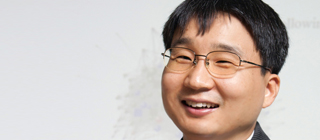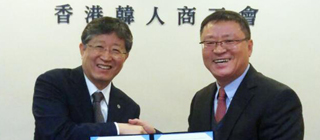-
Globally-trusted world leaders in university rankings, along with QS Only three universities in Daegu and Gyeongbuk areas, YU, POSTECH, and Gyeongbuk National University, included in the rankings YU keeps getting good results in world university rankings including QS University Rankings (Asia) and Leiden Ranking [Mar 29, 2017] 2017 THE Asian University Rankings Ranking in Korea Ranking in Asia University 1 8 KAIST 2 9 Seoul National University 3 10 POSTECH 4 13 Sungkyunkwan University 5 20 Korea University 6 29 Yonsei University 7 31 GIST 8 36 Kyung Hee University 9 38 Hanyang University 10 53 Ewha Womans University 11 60 Chung-Ang University 12 66 University of Ulsan 13 90 Busan National University 14 95 Seogang University 15 99 Sejong University 16 101-110 Yeungnam University 17 141-150 Inha University 17 141-150 Konkuk University 19 151-160 Ajou University 20 171-180 Jeonbuk National University 20 171-180 Jeonnam National University 20 171-180 Gyeongbuk National University 23 201-250 Chungnam National University 23 201-250 University of Seoul 23 201-250 SEOULTECH 26 251+ Hallym University In the ‘2017 Asian University Rankings’ published by Times Higher Education (“THE”), a world-famous university ranking publisher, Yeungnam University (“YU”) was ranked 16th in Korea (between 101st and 110th in Asia), posting an impressive jump of 6 steps from last year (22nd). THE has been publishing world university rankings since 2004, and publish Asian university rankings in March each year. For top 100 universities, individual ranks are announced, and for those between 101st and 300th, their ranking brackets are announced. Evaluation is based on five indicators – Teaching (the learning environment) (weight of 25%), Research (volume, income and reputation) (30%), Citation (research influence) (30%), International outlook (staff, students and research) (7.5%), and Industry income (knowledge transfer) (7.5%). Based on sub-items of each indicator, a total of 13 sub-indicators are used for the evaluation. Among the indicators mentioned above, YU received good evaluation in that of “Teaching,” with high evaluation weight, which led to significant rise in its ranking. In the “Teaching” indicator, YU posted a remarkable improvement of 115 steps (51st in Asia) over the previous year (166th in Asia). In addition, YU showed improvement in “Research” such as per-teaching staff number of academic articles (3.52 →4.07), academic articles citation (3.85 → 4.05), and per-teaching staff research grants from the industry (6.8 million Won → 8.6 million Won) and in “International outlook” such as international staff ratio (number of international staff: 124 → 146). In 2017, a total of 26 Korean universities were included in the aforesaid ranking, and among those in Daegu and Gyeongbuk areas, only three, YU, POSTECH (3rd in Korea, 10th in Asia) and Gyeongbuk National University (20th in Korea, between 171st and 180th in Asia), were included. In the ‘University Rankings: Asia 2016’ published by QS in June of last year, YU was ranked as 128th among Asian universities (22n in Korea). With major Korean universities generally falling or stagnating in the ranking, YU demonstrated its strength, jumping 22 steps from 2013 (150th). Also, in the 'Leiden Ranking 2016,' evaluating world universities based on their academic articles’ quality, YU was ranked 50th in the world and 1st in Korea in Mathematics & Computer Science, its world-class research power earning recognition.
-
YU’s overseas work experience partner from the US visits YU, holds overseas internship briefing and Q&A sessions Reviews student-prepared English resumes and holds interview clinic, at the briefing session 978 YU students having participated in overseas work experience program since 2002 [Apr 5, 2017] Yeungnam University (“YU”) (President Sur, Gil Soo) held an overseas work experience briefing session to strengthen students’ global competency through overseas working/living. The briefing session, managed by YU’s International Exchange Team, was held at YU’s International Exchange Center (Room 301), for 2 hours from 1:30 PM on the 5th. In particular, at the briefing session, the local agent of International Culture & Career Exchange (“ICCE”), YU’s overseas work experience partner located in Los Angeles in the US, visited YU, explained the programs to the students, and had a Q&A session. ICCE, conducting the briefing session, introduced a list of companies for which YU students can work in the US, and answered students’ overseas work experience program-related questions, such as preparation of resumes in English and procedure of visa issuance. In particular, after the briefing session, ICCE staff reviewed English resumes prepared by the students and held an interview clinic on the spot, thus attracting an enthusiastic response from the students. Mr. Hyeong-Woo Jeon (24-year old senior majoring in electric engineering in YU) attending the briefing session said, “I have been thinking about starting a business overseas, and I came to the briefing session because I thought it would help me do so to experience local corporate culture through the overseas work experience program,” and “I could get valuable information as ICCE, an agency from the US and having a long-term partnership with YU, conducted the briefing session.” YU’s overseas work experience program is attracting strong interest from YU students because not only can they acquire practical job skills in large Korean corporations’ overseas subsidiaries and in foreign companies including world-famous US garment manufacturers and improve foreign language skills, but can experience global cultures. Also, participating students can earn up to 18 credits for the work experience and receive scholarships. Since 2002, a total of 978 YU students have participated in the overseas work experience program. This year, 22 YU students are working in manufacturing companies, law firms, aviation service companies, etc. in the US. YU intends to hold at least 2 briefing sessions a semester and thereby actively support students’ overseas working/living. YU President Sur, Gil Soo said, “I hope more YU students will participate in our various global initiative programs” and “I will do everything I can to help YU students build global competency and be competitive anywhere in the world.”
-
A staff of Universiti Tun Abdul Razak in Malaysia visits YU to make a promotional video for YU Interviews professors, staff and students, and films the campus Will make a 5-minute ‘Introduce YU’ video and promote it through SNS, Universiti Tun Abdul Razak’s homepage, etc. [Mar 29, 2017] <Ms. Intan Nurshiela Ahmad, a staff of Universiti Tun Abdul Razak, is filming 'Introduce YU' promotional video> A university in Malaysia actively recommends study in Yeungnam University (“YU”) to Malaysian students. That is, a staff of Universiti Tun Abdul Razak in Malaysia is trying to make a promotional video for YU and ‘introduce YU’ to Malaysian students. On the 27th of last month, Ms. Intan Nurshiela Ahmad, a 22-year old social media marketing specialist working at Universiti Tun Abdul Razak, visited YU, to make a promotional video for YU herself. Ms. Ahmad, who studied in YU for 6 months in 2015 as a exchange student, said, “I came back to YU because I really wanted to let Malaysian students know about my precious, valuable experiences in YU” and “I was deeply impressed by YU students who were active in everything they did and studied hard. In particular, thanks to the YU students who came to me first to become my friends and actively helped me adapt to a new environment, I could learn a lot and gain experiences in YU,” as she recollected her time in YU. Ms. Ahmad said she could not forget the experiences of participating in YU’s various programs geared for foreign students, such as “Window to Korea” and “Buddy Program.” She said, “It was really cool that I could experience not only my studies but various Korea cultures. I definitely would like to have other Malaysian students participate in YU’s exchange student program and have an opportunity to taste the dynamic, diverse Korean culture.” With a camera in her hand, Ms. Ahmad went about YU campus, met and interviewed YU professors, staff, and students, and shot various corners of the campus. She plans to edit her video shot as a 5-minute promotional video and promote it to Malaysian students through SNS, Universiti Tun Abdul Razak’s homepage, etc. Ms. Ahmad said, “I will not only introduce the exchange student program through interview with professors, staff, and students, but introduce YU’s classes and educational environment which are different from those of Malaysian universities, and shoot YU’s large, beautiful campus including on-campus folk village and museum” and “I hope that the promotional video will help more Malaysian students to have an opportunity to study in YU and experience the Korean culture.” YU signed an agreement with Universiti Tun Abdul Razak in 2012 and is running an exchange student program. Eight Universiti Tun Abdul Razak students have participated in YU’s exchange student program, and four are currently studying in YU.
-
2017 Freshmen Welcoming Ceremony and Inauguration Ceremony for Self-governing Student Organizations Held 5,000 people including YU president and students participate, with constituents of YU coming together and pledging ‘YU’s development and unity’ General Student Council will form “Students’ Special Committee for YU Development and drive the 20,000 YU Students’ Campaign for YU Development Fund Raising” [Mar 30, 2017] <2017 YU freshmen welcoming ceremony and inauguration ceremony for self-governing student organizations held in YU’s open-air auditorium> All constituents of Yeungnam University (“YU”), including president, professors, and students, came together and held a meaningful event of pledging for YU’s development and unity. At 6 PM on the 28th, YU’s General Student Council (president Hun-Il Lee) held the ‘2017 YU Freshmen Welcoming Ceremony and Inauguration Ceremony for Self-Governing Student Organizations’ in YU’s open-air auditorium. YU President Sur, Gil Soo, YU faculty/staff including headquarters officials and deans of colleges, members of student councils and federation of student clubs, and freshmen - 5,000 or more in total – participated in that event. This event was prepared not as a ceremonial event simply announcing inauguration of self-governing student organizations but a venue for all YU constituents including freshmen, students, professors, and staff to come together and pledge YU’s development and unity. Mr. Hun-Il Lee (25-year old senior majoring in electric engineering), the General Student Council president, said, “the 50th, HARMONY General Student Council of YU prepared for this inauguration ceremony to strengthen our resolve for YU’s development,” and promised “General Student Council will listen carefully to the voices of 23,000 fellow YU students, and lead the way so that all constituents of YU will be united and go forward in the same direction.” At the event, in addition to pre-ceremony performances by YU’s Chunma (Flying Horse) Cheering Squad, dance majors in the School of Kinesiology (College of Human Ecology & Kinesiology), and the Department of Korean Classical Music students (College of Music), there were greetings by chairman of the faculty council and chairman of the non-faculty staff’s union, and introductions of self-governing student organizations including presidents of student councils, federation of student clubs, and central audit committee), and then General Student Council’s inauguration was officially proclaimed. In particular, General Student Council, in the ceremony for its inauguration (main event), declared that it would form the ‘Students’ Special Committee for YU Development’ and drive the ‘20,000 YU Students’ Relay Campaign for YU Development Fund Raising,’ and held a balloon flying event wishing for YU’s development and YU constituents’ unity. General Student Council plans to make an extensive drive for ‘1,000 Won per student’ fund-raising campaign from the students, until the start of Daedong Festival, YU’s festival scheduled for May. The entire amount raised will be contributed to the University Development Fund during the Daedong Festival. President Sur, Gil Soo said, “On this day at this place, I have engraved deep in my heart our students’ earnest wish for YU’s development,” and “I will do my best as president to make YU a university which the students want and take pride in.”
-
School of Materials Science and Engineering Professor Ko Young-gun's team applies 'plasma electrolysis oxidation technologies' using the principles of volcanic explosions Succeeded in controlling plasma intensity, ceramic coating layer 'surface property improved significantly' Published in the recent online edition of the world acclaimed academic journal 'Scientific Report' [March 21, 2017] <YU School of Materials Science and Engineering research team developed a new technology that connects metals with ceramics.> (left to right: Muhamad Prisla Kamil, Professor Ko Young-gun) The YU School of Materials Science and Engineering Professor Ko Young-gun's research team attracted attention from academic circles by developing a new technology that connects metals with ceramics. Recently, Professor Ko's research team announced the research results for 'Metal-Ceramic Connecting Coating Technologies using Soft Plasma Arc Technologies'. Plasma separates electrons with negative electric charges and ion with electrons and positive electric charges at extremely high temperatures, and is called a 'fourth state of matter' that is not solid, liquid or gas. Such plasma is applied in various areas from extremely high temperature nuclear fusion at billions of degrees to semiconductor processes and new material combination as well as plasma discharge. In this study, the research team applied 'PEO (Plasma Electrolytic Oxidation)' using plasma. Professor Ko said, "Plasma electrolysis oxidation technologies are very similar to the mechanism of natural volcanic explosions. Just as new islands such as Jeju-do and Hawaii are formed on the surface through extreme volcanic activities, it is possible to create a ceramic layer on a metal surface through high energy plasma." He added, "By developing a new technology that can control plasma intensity, it was possible to form a ceramic layer on a metal surface, while significantly improving surface properties by utilizing the unique features of ceramics." <Figure 1> <Figure 1. Comparison of Volcanic Activities and Plasma Electrolysis Oxidation Technologies> In particular, Professor Ko's research team utilized ethylenediaminetetraacetic acid (EDTA) and copper-EDTA organic compounds to successfully control 'soft plasma-arc'. Defects and pores that occur due to <Figure 2> were considerably decreased. <Figure 2. Soft plasma arc controlled by organic compounds> The research results were published in the latest (March 10) online version of <Scientific Reports> (impact factor (IF) 5.228), which is the sister journal of Nature. Professor Ko said, "In the case of actual volcanic activities, it is not possible for humans to adjust the intensity of volcanic explosions, but in the case of plasma arcs, we have finally made it possible through this research for humans to control it." He added, "The results of this study is a groundbreaking electro-chemical technology that can improve the anti-oxidizing, anti-abrasion, and bio properties of nonferrous metals such as magnesium, aluminum and titanium in the future. In particular, the fields of application are unlimited depending on organic-inorganic combinations, and so it can be utilized to create new industries related to new material surface control technologies such as mobile devices, automobiles and implants. Meanwhile, this study was carried out with the support of the Ministry of Trade, Industry and Energy, and Muahamad Prisla Kamil (25, YU Graduate School of Materials Science and Engineering, 5th terms in Master's and PhD combined program) from Indonesia participated as the first author, while advisor Ko Young-gun participated as a correspondence author.
-
Contains 8 songs to make the general public become more aware about 'Dokdo' Composer Choi Young-seop who wrote 'Longing Geumgangsan' and poet Gosan Choi Dong-ho also participated [March 16, 2017] The YU Dokdo Research Center produced an album (CD) titled 'Special Tune for Dokdo' filled with love for Dokdo. The 'Special Tune for Dokdo' is a PR album for Dokdo made through the collaboration of the YU Dokdo Research Institute and cultural artists to attract more interest among the general public about Dokdo and to spread facts about Dokdo. Composer Choi Young-seop who wrote the nationally popular 'Longing Geumgangsan', former Seoul National University College of Music Professor Kim In-hye, Gachon University Song Gi-chang, Soongsil University Professor Noh Hee-seop, vocalist Kwon Soon-dong, and singer In Dong-nam participated in making this album. The lyrics for all of the tunes included in this album were written by the poet, Gosan Choi Dong-ho. The album contains eight tracks such as 'Dokdo is not Lonely', 'Oh, Our Dokdo', 'Lighthouse of Dokdo', 'Our Island Dokdo', 'Moonlit Night of Dokdo', 'Forever Dokdo', 'Dokdo Forever', and 'Dokdo is my Friend (Children's Song)'. YU Dokdo Research Center Director Choi Jae-mok said, "Japan recently revised their 'teaching instructions' and made it mandatory to state Dokdo as Japan's territory, as they openly claim territorial rights over Dokdo. The Dokdo Research Center has been working on spreading its research results to the public using various ways in addition to research activities and academic conferences." He added, "I hope that the 'Special Tune for Dokdo' will be a good opportunity for the general public to learn about the value of Dokdo and gain a love for country naturally through this." The 'Special Tune for Dokdo' will be distributed to institutes related to research and PR of Dokdo, and also be used in various academic conferences and Dokdo-related events. The YU Dokdo Research Center was the first-ever research institute specializing in Dokdo in Korea established in May of 2005. In December 2007, it was selected as a main policy research center for the Ministry of Education and has been continuously working on investigating historical truths about Dokdo and revealing the falsity of Japan's claims over it. After the first main policy research center project ended, it began the 2nd project 'Convergence Research to Establish Territorial Rights over Dokdo' from October 2016. The YU Dokdo Research Center has been engaged in active research activities and academic conferences so that researchers of Dokdo in Japan and all around the world can easily understand the data based on history and facts, and has been searching for ways to fundamentally stop Japan from their ambition to steal Dokdo. Furthermore, it has been searching for ways to solidify territorial rights over Dokdo through Dokdo open lectures and is planning to engage in public education activities to strengthen the logical basis for Dokdo.
-
Joint international research with 19 universities and research institutes including Japan's National Basic Biology Research Center and Tokyo University Published in the world-acclaimed academic journal 'Nature Communications' Expected to interpret genetic functions, generate flower anthocyanin, and be used for food crop research [March 15, 2017] <Department of Horticulture and Life Science Professor Park Gyeong-il who was the first to complete the genome map of morning glory> YU Department of Horticulture and Life Science Professor Park Gyeong-il (48) became the first to complete the genome map of the morning glory flower, attracting attention from academic circles. The morning glory has over 1,500 mutant species so it is easy to conduct plant genetics research, and it is being used as a model for flowering plant properties research. However, it was only until recently that the morning glory's genome map was complete. Professor Park, through joint international research, completed the draft of 15 genome maps of the morning glory for the first time in the world. Research on plant chromosomes is just as complex as chromosome research of animals and humans. A total of 19 universities and research institutes both in Korea and abroad including YU, Japan's National Basic Biology Research Center, Tokyo University, and Keio University participated in drafting the morning glory genome map. Professor Park said, "The morning glory is a horticultural plant and are normally used as ornamental plants. It has various mutations so it has high value for research." He added, "By completing the first draft of the genome map, we created a foundation to be utilized as basic data for genetic function analysis for investigating the roles of morning glory genetics." The research results were recently published in the world-acclaimed academic journal <Nature Communications> (impact factor (IF) 11.329). Nature Communications is published by Nature Publishing Group, which also publishes the global scientific magazine Nature, and it has global prominence in all fields of natural science such as physics, chemistry, biology and earth science. Over 1,000 papers from around the world are submitted every month, and only those that pass rigorous reviews are published. Professor Park stated, "With this study, about 91% of the genome map for the morning glory has been completed. We are planning to use the map for various follow-up research such as interpreting the genetic functions, division of species, and manifestation of flower anthocyanin. It will also be possible to utilize in conducting research for food crops such as sweet potatoes as well." Professor Park earned his PhD in 2000 at YU and worked at Japan's Basic Biology Research Center for eight years as a researcher, and returned to Korea and served as a professor at the YU Department of Horticulture and Life Science.
-
The National Institute of Forest Science under the Korea Forest Service donated 198 three-year seedlings of 33 varieties of domestic and foreign mugunghwa (rose of sharon) Joined by 150 people such as students of the Department of Forest Resources and Landscape Architecture to establish the 'Mugunghwa Variety Preservation Center' within the campus To be used for preservation of mugunghwa varieties, research, and field studies [March 24, 2017] YU (President Sur Gil-soo) held a plant-planting event right ahead of Arbor Day (April 5). On the 24th, 198 specimens comprised of 33 varieties of the mugunghwa (rose of sharon) were planted in front of the Folk Village Hwasan Seodang inside of campus. Over 150 people participated in this event including YU Vice President of Administration Han Dong-geun, Facility Management Office Director Kim Gi-chae, College of Life and Applied Sciences Dean Kang Yong-ho and students from the Department of Forest Resources and Landscape Architecture. <Department of Forest Resources and Landscape Architecture students participating in the plant-planting event to establish the 'Mugunghwa Variety Preservation Center'> Vice President of Administration Han Dong-geun said, "It is meaningful to plant the mugunghwa, which is our national flower, donated by the National Institute of Forest Science for Arbor Day." He added, "I hope that this small event today will be an opportunity to give hope to future generations and to be a time for us to remember to love our country." The mugunghwa planted today were donated by the Korea Forest Service's National Institute of Forest Science, and we are planning to make this into a Mugunghwa Variety Preservation Center (Senior Researcher - Department of Forest Resources and Landscape Architecture Professor Lee Do-hyung) in order to preserve the varieties of the mugunghwa, as well as conduct research and studies on it. The mugunghwa donated by the National Institute of Forest Science are all three-year seedlings comprised of 33 varieties, where 24 are domestic and 9 are foreign. Kim Hee-young (23, senior in the Department of Forest Resources and Landscape Architecture) who participated in this event said, "As a student majoring in forest resources, I have been participating in plant-planting events every year. It is even more meaningful this year as we were able to create a Mugunghwa Variety Preservation Center within the campus with the help of the National Institute of Forest Science." She added, "I hope that the experience of planting a tree in this event will be an opportunity for students to take care of trees and treat them with care."
-
Nobel prize of the science information sector, with no winners from Asia yet Only Professor Park selected as candidate for this year from Korea Webometrics expert recognized for global research achievement [March 3, 2017] YU Department of Media and Communication Professor Park Han-woo (45) was selected as a candidate for the 'Derek de Solla Price' award, which is also known as the Nobel prize of the science information sector. There was no winner of the Derek de Solla Price award from Asia yet. A total of 33 people are candidates for this year's award, and among the 10 main candidates likely to be chosen as the winner, Professor Park is the only candidate from Asia. Professor Park is an expert in webometrics, which is on the quantitative analysis of the web, and big data sectors. Professor Park led the 'YU WCU Webometrics Project Team' that received government support since 2008, and has made outstanding research achievements such as publishing over a hundred theses in world acclaimed academic journals based on the theme of social network analysis through website contents and hyperlinks. In particular, upon analyzing the productivity, impact and collaboration of the 5,417 theses in the measurement informatics sector published in 75 countries since 1964 (1948-2012) in 2014, Professor Park was ranked 13th in the betweenness centrality rankings. Professor Park was recognized internationally for his achievements and has been active as an editor for the SSCI international academic journal 'Big Data & Society', 'Technological Forecasting & Social Change' and Scientometrics'. Professor Park earned his PhD at New York State University and constructed a wide ranging academic exchange network together with researchers of North America and Europe while working at the Royal Netherlands Academy of Arts and Sciences and the Oxford Internet Institute. After returning to Korea, he established a global academic society on the theme of 'Triple Helix', which is a new cooperative model of industry, academics and government. 'Derek de Solla Price' became known as the 'Father of Scientometrics' after investigating scientific knowledge production and citation structures through his book, 'Little Science, Big Science 1963) and 'Networks for Scientific Papers' carried in the world-acclaimed science journal 'Science' in 1965. Scientometrics is the 'science of science' that makes quantitative analysis on the production and development of academic fields based on the types and publications of researchers, and it contributed significantly in the birth of today's 'Big Data'. The 'Derek de Solla Price' award selected its first winner with Eugene Garfield of the US in 1984 for his contributions by establishing the science technology thesis citation index (SCI) database, and a total of 18 people received this award. The final winner of this year will be determined on March 15 through votes by past winners and editors of the international journal, 'Scientometrics'.
-
Dispatch students from July to receive field training at local companies in international commerce and finance for six months Agreements for exchange with Hong Kong Lingnan University for admissions of exchange students, language programs and cultural exchange programs [March 9, 2017] <YU and the Korean Chamber of Commerce in Hong Kong signed an MOU to operate overseas field training programs.> (from left to right: YU External Cooperation Office Director Lee Hee-wook, Korean Chamber of Commerce in Hong Kong Chairman Yoon Bong-hee) The global network of YU (President Sur Gil-soo) has expanded to Hong Kong, the central city of the international finance market and Asia's economy. Recently, YU visited the Korean Chamber of Commerce in Hong Kong, Lingnan University in Hong Kong, and local companies to discuss matters on operating overseas field training programs for students and on plans to promote exchange. First, YU External Cooperation Office Director Lee Hee-wook recently visited the Korean Chamber of Commerce in Hong Kong to sign an MOU to pursue overseas field training programs for YU students. With this MOU, the Korean Chamber of Commerce in Hong Kong will cooperate with YU in overseas field training planning, operation, finding and managing local companies, orientation, and adaptation support, while promising to provide full support so that YU students can participate in high quality overseas field training programs. The Korean Chamber of Commerce in Hong Kong that was founded in May 1976 has over 200 member companies comprised of Korean companies located in Hong Kong and companies founded by Korean immigrants. It has been overseeing field training programs for Korean college students since 2014 and they are expected to provide significant help in YU students entering the global arena. YU is planning to send students for overseas field training to Hong Kong starting in July. The dispatched students will engage in field training for six months at local companies in various industries including international commerce, finance, law, management, accounting, media, PR, and restaurant industries. During this visit to Hong Kong, YU also discussed plans to promote exchange with Lingnan University in Hong Kong. Lingnan University is a public university that focuses on humanities and social sciences such as language, history, society and economy, and it is one of the top universities in Hong Kong for humanities. YU and Lingnan University discussed matters such as ▲approving admissions to exchange students recommended by the university ▲promotion of short-term language and cultural exchange programs, and ▲participation in international academic conferences. Personnel from Lingnan University will visit YU in April to discuss the detailed operation plans for this. In addition, YU agreed to operate internship programs linked with employment with 'SL Enterprise', a Hong Kong educational institute specializing in Korean language. YU President Sur Gil-soo said, "Overseas field training programs will not only improve the global capacity of students during enrollment, but also be an opportunity to broaden employment options by looking towards overseas markets as well." He added, "We will continue to expand global education programs so that YU students can be active in various fields both domestically and internationally."
